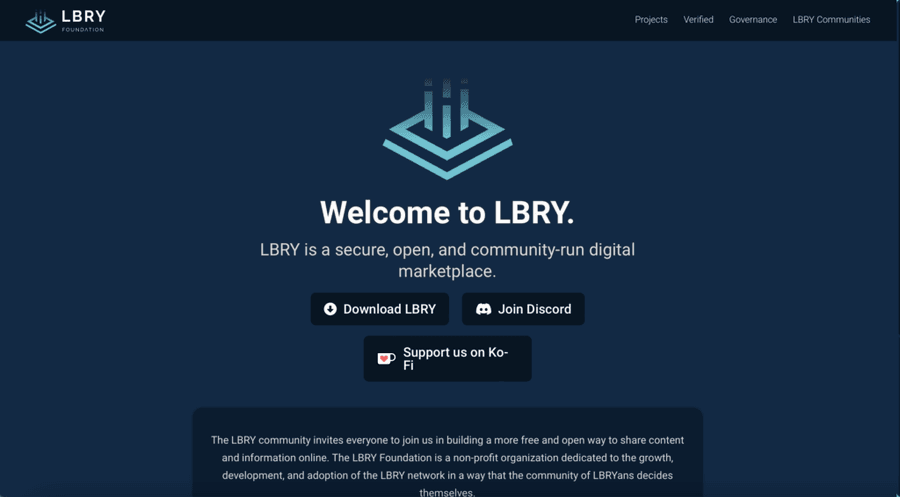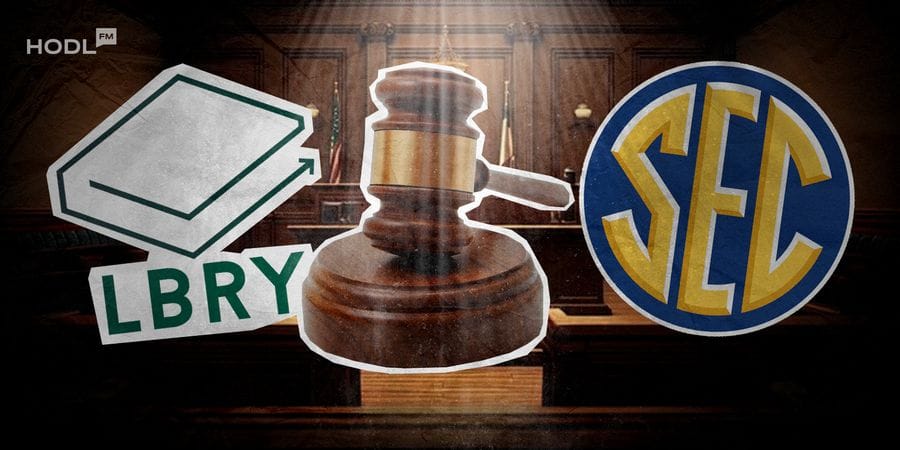LBRY, a blockchain firm, has been in a legal battle with the U.S. Securities and Exchange Commission (SEC). The company recently filed a notice of appeal against the SEC’s actions, marking a significant development in this ongoing legal dispute. The case revolves around classifying LBRY’s tokens, with the SEC claiming they are securities. This decision could have implications not only for LBRY but also for the broader cryptocurrency industry.
Read more: The SEC vs. NFTs: What You Need to Know
The legal proceedings have attracted attention within the crypto community and beyond, with some parallels being drawn to other cases, such as Ripple’s ongoing legal battle. LBRY’s decision to appeal the SEC’s actions indicates the company’s determination to challenge the regulatory body’s classification and defend the nature of its tokens.

Additionally, it’s worth noting that the SEC lost an appeal in the LBRY vs. SEC case in a related development, which could have broader implications for how the SEC regulates the cryptocurrency space. This loss may influence the SEC’s approach to future cases involving the classification of digital assets.
LBRY’s appeal against the SEC’s classification of its tokens as securities is an ongoing legal battle with potential repercussions for the cryptocurrency industry. It reflects the broader regulatory challenges and uncertainties blockchain firms face in the United States.

LBRY’s ongoing battle with the SEC
LBRY, the blockchain-based content-sharing platform, has been in the eye of a regulatory storm, with the U.S. Securities and Exchange Commission (SEC) as its adversary. This contentious showdown revolves around classifying LBRY’s digital tokens (LBC) and delves into the heart of the ongoing cryptocurrency regulation debate.
The SEC has accused LBRY of violating U.S. securities laws by offering unregistered securities through its LBC tokens. This legal fracas has not only put LBRY in the spotlight but has broader implications for the cryptocurrency industry.
Read more: Meet the Biggest Crypto Villains to Walk the Earth!
LBRY’s decision to challenge the SEC’s ruling is a bold stance. It reflects their unwavering belief in the legitimacy of their protocol and the non-security nature of their tokens. This move is seen by many in the crypto community as a critical battle in the struggle for regulatory clarity in an industry often plagued by uncertainty.
As of the latest developments, LBRY has officially declared its intent to contest the SEC’s allegations, ensuring this legal saga will continue. The outcome of this case will undoubtedly shape how regulators approach cryptocurrency-related matters, leaving a lasting mark on the industry.
LBRY’s ongoing battle with the SEC is a compelling narrative of a blockchain firm challenging regulatory authority. It serves as a litmus test for the evolving landscape of cryptocurrency regulations, and the final judgment will resonate far beyond the LBRY protocol itself, influencing how the world views digital assets.

What LBRY is and its core blockchain-based content-sharing platform
LBRY is a blockchain-based content-sharing platform that operates on a decentralized network. It offers several key features, such as;
Decentralization
LBRY operates on a decentralized network, which means no central authority controls content distribution. This decentralization reduces the risk of censorship and ensures that content creators have more control over their work.
Blockchain Technology
LBRY utilizes blockchain technology to manage and distribute content. This technology ensures transparency and security in content transactions, making it resistant to tampering.
Content Ownership
Content creators on LBRY have full ownership of their content. They can publish their work on the platform, set their terms, and earn rewards through LBRY’s cryptocurrency, LBC (LBRY Credits).
Monetization
LBRY enables content monetization through microtransactions. Users can directly support creators by paying for content using LBC, providing an alternative revenue stream to traditional advertising.
Open Source
LBRY is open source, meaning its code is publicly available and can be audited by anyone. This transparency fosters trust among its user base.
Content Discovery
LBRY provides a user-friendly interface for content discovery, making it easy for users to find and access a wide range of content.

SEC’s allegations against LBRY
The U.S. Securities and Exchange Commission, SEC sued LBRY, Inc. concerning selling unregistered securities. According to the SEC’s litigation release, LBRY’s digital tokens, LBC, were deemed securities under U.S. federal securities laws. This led to a legal battle between the SEC and LBRY.
LBRY’s initial response to the SEC’s lawsuit was to challenge the allegations. LBRY contested the SEC’s characterization of LBC as securities, arguing that they were utility tokens used for accessing content and services within the LBRY network rather than traditional securities.
The LBRY case garnered significant attention within the cryptocurrency and blockchain communities due to its potential implications for the broader industry. It underscored the regulatory uncertainty surrounding digital assets and the need for clarity in classifying tokens.
As of the available sources, LBRY’s legal battle with the SEC remained ongoing, and the outcome could have lasting consequences for how regulators approach cryptocurrency-related cases and token classifications. The case highlights the importance of regulatory compliance and legal challenges faced by blockchain-based platforms operating in the United States.
Timeline and key events leading up to the Notice of Appeal against the SEC
The LBRY case against the U.S. Securities and Exchange Commission (SEC) has been marked by significant events and developments.
- Initial SEC Lawsuit
The SEC initially filed a lawsuit against LBRY, alleging that LBRY’s digital tokens (LBC) were unregistered securities under U.S. federal securities laws.
- SEC’s Ruling
The SEC’s lawsuit led to a court ruling that favored the SEC’s position, finding that LBC tokens were indeed securities.
- LBRY’s Response
In response to the SEC’s lawsuit and the court ruling, LBRY decided to challenge the verdict. They expressed their intention to file a Notice of Appeal against the SEC’s decision.
- John Deaton’s Involvement
Notably, XRP lawyer John Deaton joined the LBRY case as an Amicus Curiae, providing additional legal expertise and support to LBRY in their appeal against the SEC.
- Notice of Appeal
The timeline culminated with LBRY officially filing a Notice of Appeal against the SEC’s ruling based on the LBRY lawsuit update. This legal action signified LBRY’s determination to contest the SEC’s classification of LBC tokens as securities.
- Ongoing Legal Battle
The LBRY case remained ongoing, with the appeal process underway. The outcome of this case will have implications for how regulatory bodies classify digital tokens and their potential impact on blockchain-based platforms.
More Info:
- Decoding the Delay: SEC Extends Bitcoin ETF Approval Timeline to 2024
- Grayscale Wins the Court Battle Against SEC
- Navigating Ripple’s Legal Drama: The SEC Lawsuit
FAQs
LBRY’s journey from the SEC’s initial lawsuit to the Notice of Appeal represents a significant legal battle in the cryptocurrency industry, emphasizing the importance of regulatory clarity and the challenges faced by blockchain projects in navigating complex legal landscapes. Below are some frequently asked questions.

What is the SEC vs. LBRY case?
The LBRY vs. SEC case is a legal dispute between LBRY, Inc., a blockchain-based content-sharing platform, and the U.S. Securities and Exchange Commission (SEC).
In this case, the SEC alleged that LBRY’s digital tokens, known as LBC, were unregistered securities under U.S. federal securities laws. The SEC argued that these tokens should have been registered as securities and subjected to regulatory oversight.
What was the summary Judgment of the SEC v LBRY case?
The summary judgment ruled that LBRY’s digital tokens, known as LBC, were considered securities and should have been registered as such under U.S. federal securities laws.
This judgment implied that LBRY had violated securities laws by failing to register its tokens as securities with the SEC. The ruling had significant implications for LBRY, indicating that they were subject to regulatory oversight and legal consequences for non-compliance with securities regulations.
The summary judgment represented a victory for the SEC in its efforts to regulate digital tokens within the cryptocurrency industry. It underscored the importance of compliance with securities laws in the evolving regulatory landscape of blockchain and cryptocurrency markets.
Did LBRY win the lawsuit?
No LIBRY did not win the case; however, they are challenging the previous ruling through an ongoing appeal process.

Disclaimer: All materials on this site are for informational purposes only. None of the material should be interpreted as investment advice. Please note that despite the nature of much of the material created and hosted on this website, HODL FM is not a financial reference resource and the opinions of authors and other contributors are their own and should not be taken as financial advice. If you require advice of this sort, HODL FM strongly recommends contacting a qualified industry professional.




